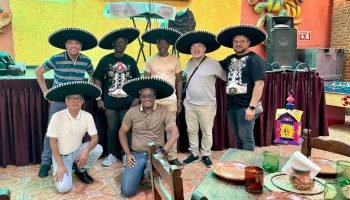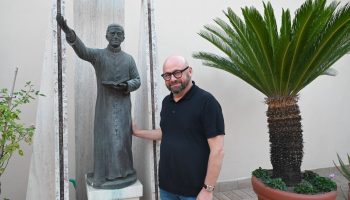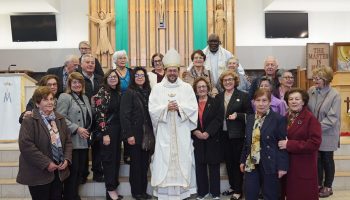
The Canonization of Blessed Joseph Allamano is an occasion that members of the two Institutes he founded have been looking forward to for close to a century, Bishop José Luís Gerardo Ponce de León of the Catholic Diocese of Manzini in the Kingdom of Eswatini has said.
By ACI Africa Staff*
In an interview with ACI Africa in Rome, the Bishop of the only Catholic Diocese of the Southern African landlocked nation previously known as Swaziland, who is a member of the Institute of the Consolata Missionaries (IMC) has retraced his journey into Institute ahead of the Canonization of its founder on October 20, World Mission Sunday 2024.
The Italian-born founder of the IMC and the Consolata Missionary Sisters (MC) in 1901, who passed on in 1926 aged 75 is set to be Canonized alongside 13 others, including Mother Elena Guerra (1835–1914); Mother Marie-Léonie Paradis (1840–1912); and 11 Martyrs of Damascus in Syria (m. 1860).

In the Wednesday, October 17 interview at the EWTN Vatican bureau, Bishop José described Blessed Joseph Allamano as “a Diocesan Priest with a passion for the missionary work of the Church.”
While such a passion “must be something normal” today, he said, “when you think about it over a hundred years ago, that was something different.”
Blessed Allamano, the Argentine-born IMC member went on to say, was “someone who had been touched by the joy of Jesus and who wanted to share Him with everyone, but His own health would not allow him.”
The passion for the mission amid personal health challenges “triggered the saying, ‘well I cannot go, but I might be able to send others.’ And I think he came across young Priests with that missionary passion who didn’t have how to, and so he is the one who prepared the way for them.” Bishop José said about the founder of IMC and MC, who remained a Diocesan Priest in Italy’s Catholic Archdiocese of Turin his entire life yet left a global legacy.
According to Bishop José, Blessed Allamano “journeyed” with the pioneer Priests to the Consolata missions, orienting them on “how they have to be missionaries.”
Asked what the Canonization celebration slated for October 20 means for him and the Consolata missionaries across the globe, the Catholic Bishop said, “We have been looking forward to this moment”.
“It’s a way of saying the Church recognizes what we have always believed in our hearts, that he was a Saint,” he explained.
Relevance of Canonization
When Allamano was beatified on 7 October 1990, Bishop José has recalled, “I had been a Priest for four years at that time. We saw this at a distance from Argentina and we have been looking forward to this moment” – of his Canonization.
“We say this not only out of love, but also because of the spirit with which he has marked each one of us, Priests, Brothers, Sisters, Bishops,” he said.
Bishop José went on to recall “some years ago writing a letter to the chapter of the Consolata of Missionaries saying, no matter where we were born, no matter where we did our studies, no matter when, there is clearly a spirit (of Blessed Allamano) that has marked all of us.”
The Canonization of Blessed Allamano is a celebration of his spirit among members of the Consolata Missionaries, he said, and emphasized, “That is what we celebrate, that this spirit is recognized by the Church and the gift that this spirit is to the Church all over the world.”
Blessed Allamano’s “missionary spirit”
Bishop José identified Blessed Allamano’s “missionary spirit” as the most memorable aspect that has impacted Consolata Missionaries across the globe.
For Allamano, the Catholic Bishop said, “being a Priest and being a missionary are two things that come together because naturally if you are a Priest you want to share Christ, but not only in your own place, you want Him to be known by everyone.”
As Consolata Missionaries, he went on to say, “we don’t make noise; we are always known for our presence.”

Asked about Blessed Allamano’s relevance for the people of God in Africa, Bishop José said, “We were born initially for Africa. In fact, Kenya was our first presence; and then, of course, we extended to Latin America and today also in Asia.”
He said that Africans have also taken up leadership roles in the Italian-founded Missionary Institute, and added, “All the Consolata Superiors in the different countries are coming for this event (Canonization), and a number of them are from Africa. It’s very interesting how they have taken over the leadership of our presence, not only in the continent.”

Retracing personal journey
Bishop José shared about his own calling to the Priesthood, Religious, and missionary life as having come “as a package. It was always the three things together; never one without the other, two without the other one.”
He attributed his Priestly, Religious, and missionary calling in the 1970s to the Consolata missionaries, who, he revealed, “were not that known in Argentina, particularly in my hometown in Buenos Aires.”
Being part of a Catholic youth group and having to shift to two successive Parishes as a group owing to “differences” with Priests brought the young José in contact with Consolata Missionaries.
After shifting to a third Parish in Buenos Aires, Bishop José recalled during the October 17 interview with ACI Africa at EWTN Vatican bureau, “we came to find the Consolata Missionaries; and that meeting opened the horizons in my life, because I was not aware, in the 1970s, of the missionary work of the Church.”

The Catholic Church leader, who has nurtured his personal interest in communication and regularly updates his social media accountswith content he creates went on to recall how the encounter with Consolata Missionaries ignited in him “the passion to tell the story in communication.”
“Some missionaries here in Italy had produced documentaries about the work of the Church, the work of Consolata missionaries in Africa, in Latin America, and that opened my eyes to that,” Bishop José said, tracing the birth for his passion for communication and the mission of the Church.
“And since then, that was my call. I was sent to study in Colombia. I had an amazing time as a novice in Bucaramanga in Colombia, and then theology in Bogota … We were home in Colombia; and we had a great presence in so many different places, and that helped us deepen our call,” the Consolata Missionary Bishop, who took his first vows in January 1983 and made his perpetual profession in December 1985 told ACI Africa.
Ahead of his admission to Holy Orders in 1986, he expressed his desire to be commissioned to either Ethiopia, Mozambique, or South Africa, he recalled during the on October 17 interview, adding that he had also indicated that he would be “available to go to Asia.”
He would be commissioned to South Korea, and later to his native country of Argentina.
After some years of service in Argentina, Bishop José recalls reaching out to the Superior General and expressing his desire to be commissioned “elsewhere”.
“I did my studies here. Time is passing. I am afraid I will never be sent, and that’s why I joined the community … So, I said, ‘do me a favour; appoint me somewhere else before it’s too late.’ And he appointed me to South Africa,” he said, recalling the decision that he realized in January 1994.

“I arrived in South Africa at the blessed time … it was a blessing to be there when Mandela became president in April 1994; and I was there for 11 years,” the Catholic Bishop said about his missionary experience on the African continent before he was transferred to Rome for what he described as “some office work for the community”.
“And as I was here, Pope Benedict (XVI) appointed me Bishop of the Vicariate of Ingwavuma in South Africa,” he said, recalling the decision that was made publish in November 2008 and realized in April 2009 when he was Consecrated Bishop.
After three years of Episcopal Ministry in the South African Vicariate, Bishop José was transferred to Manzini in eSwatini, the one-nation Diocese that had lost its Local Ordinary, Bishop Louis Ncamiso Ndlovu, at the age of 67.
The Consolata Missionary Bishop has been at the helm of Manzini Diocese since his installation in January 2014.
Blessed Allamano’s intercession: miracles
Asked about particular signs he can attribute to the intercession of Blessed Allamano, Bishop José recalled the healing of Sorino Yanomami, who was attacked by a jaguar in the Amazon rainforest in 1996, fracturing his skull. This is the unique medical miracle that the Vatican recognized as attributed to the intercession of Blessed Allamano, paving the way for his October 20 Canonization.

Additionally, the Catholic Bishop of Manzini said, “there have been moments in which I have entrusted to his intercession certain things that were happening in the Diocese. But the one that I always remember is when I was Superior of the Consolata Missionaries in South Africa, and a very dynamic and committed missionary suddenly became sick.”
The IMC Bishop went on to narrate the experience of his Italian-born confrere, who, “about 20-25 years ago, suddenly got sick to the point he had a back problem that would not allow him to sit down. He would be praying, standing all the time; he would be watching TV, standing; he would go to bed for a couple of hours and then out of pain he had to stand up again.”
In line with the medical doctor’s recommendation for surgery, the Bishop recalled, he went ahead to organize for the surgery.
“As I was driving back to my Parish, 3-4 hours away, I started a Novena to Blessed Joseph Allamano, saying, ‘please, do something for this, our brother, your son’. And interestingly enough, that’s why I always remember it, because four days later, on a Monday morning, he phones me and says, I’m fine, cancel the surgery.”
He sought an explanation from his confrere, who he recalls saying, “I was just working outside in the garden. I felt something and the pain is gone.”

“I wasn’t really believing that things could happen in this way. But it was true; it was true. We cancelled the surgery,” Bishop José shared, attributing the healing of his confrere to the intercession of Blessed Allamano.
Today, the Catholic Bishop says, his confrere who turned 80 a couple of years ago “works in his parish, in full dedication. He had never been sick before; he was never sick after that.”
“And in my heart, I always believed that it was the intercession of Father Joseph Allamano for one of his own missionaries,” Bishop José said, adding that the Consolata Priest has continued to serve with him in eSwatini since September 2014, “dynamic as ever.”
Message ahead of Canonization
Blessed Allamano was “marked” by the desire to share his personal encounter with Jesus Christ as a joyful experience, Bishop José said.
He added, “There is a basic thing that if you know Jesus, you want to share him. I always make this joke that when you receive good news, unless it is that you got money, you want to share this with everyone. If you’ve got money, you keep quiet because you’re afraid of the consequences.”
Indeed, he reiterated, “when there is something that really brings you joy, you naturally talk about it with everyone. You want to share that joy with everyone.”

“I think this is what marked Allamano, and this is what should be marking each one of us as Christians,” he said, and added that the fact that Allamano is set to be canonized on Mission Sunday is special. “It couldn’t be a better day for us,” the Consolata Missionary Bishop said.
He called upon the people of God to heed Pope Francis’ message for the World Mission Day 2024 captured in the theme, “Go and invite everyone to the banquet”.
“This is what we should be constantly doing as a church, reaching out; ‘not only to go’, Pope Francis says in his message, ‘it’s not just to go, it’s to invite them.’ It’s a matter of communion, building the family. Everything comes together: communion, participation, and mission,” Bishop José said, and alluding to the theme of the multi-year Synod on Synodality, which Pope Francis extended to 2024.
Some 1,300 delegates of Consolata Missionaries from the 40 countries, where they serve are expected to participate in the October 20 Canonization Mass to be presided over by the Holy Father at the Vatican from 10.30 a.m. local time.



